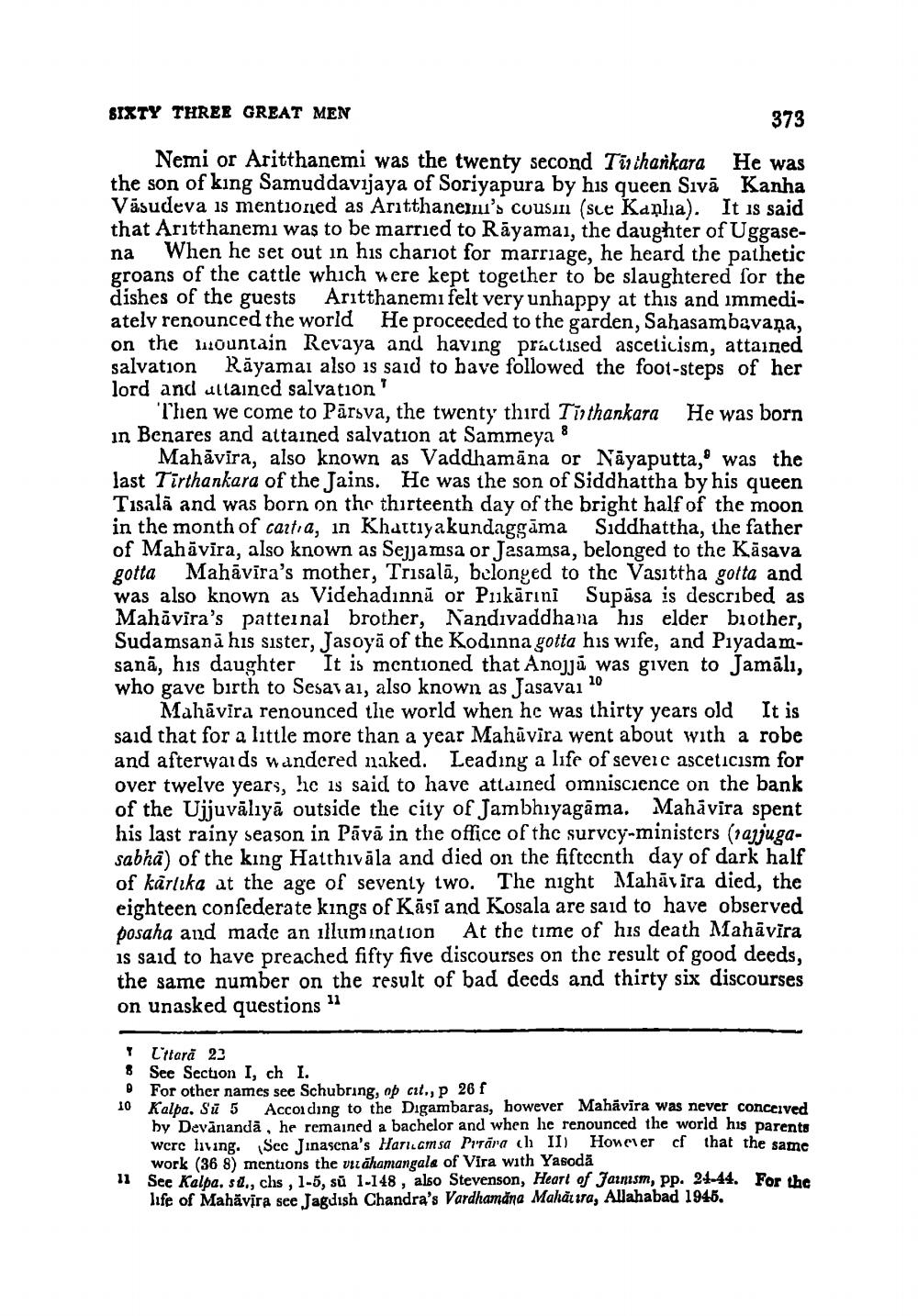________________
SIXTY THREE GREAT MEN
373
Nemi or Aritthanemi was the twenty second Tis tharkara He was the son of king Samuddavijaya of Soriyapura by his queen Sıvā Kanha Vasudeva is mentioned as Artthanenu's cousin (sce Kanha). It is said that Aritthanemı was to be married to Rāyamai, the daughter of Uggasena When he set out in his chariot for marriage, he heard the pathetic groans of the cattle which were kept together to be slaughtered for the dishes of the guests Aritthanemı felt very unhappy at this and immediately renounced the world He proceeded to the garden, Sahasambavana, on the Imountain Revaya and having practised asceticism, attained salvation Rāyamai also is said to have followed the foot-steps of her lord and attained salvation'
Then we come to Pārsva, the twenty third Tirthankara He was born in Benares and attained salvation at Sammeya
Mahavira, also known as Vaddhamāna or Nayaputta,' was the last Tirthankara of the Jains. He was the son of Siddhattha by his queen Tisala and was born on the thirteenth day of the bright half of the moon in the month of cartıa, in Khattiyakundaggāma Siddhattha, the father of Mahāvīra, also known as Sejjamsa or Jasamsa, belonged to the Kāsava gotta Mahāvīra's mother, Trisalā, belonged to thc Vasittha gotta and was also known as Videhadınnā or Pukārıni Supāsa is described as Mahavira's patternal brother, Nandıvaddhana his elder brother, Sudamsanā his sister, Jasoyā of the Kodinna gotta his wife, and Piyadamsanā, his daughter It is mentioned that Anojjā was given to Jamāli, who gave birth to Sesavai, also known as Jasavai 10
Mahāvira renounced the world when he was thirty years old It is said that for a little more than a year Mahāvīra went about with a robe and afterwards wandered naked. Leading a life of severc asceticism for over twelve years, he is said to have attained omniscience on the bank of the Ujjuvālıyā outside the city of Jambhıyagāma. Mahāvira spent his last rainy season in Pāvā in the office of the survey-ministers (najjugasabha of the king Hatthivāla and died on the fiftccnth day of dark half of karlika at the age of seventy two. The night Mahāvīra died, the eighteen confederate kings of Kāsi and Kosala are said to have observed posaha and made an illumination At the time of his death Mahāvira is said to have preached fifty five discourses on the result of good deeds, the same number on the result of bad deeds and thirty six discourses on unasked questions"
Urtară 22 ! See Section I, ch I. 0 For other names see Schubring, op cit., P 26 f 10 Kalpa. Sū 5 According to the Digambaras, however Mahavira was never conceived
hy Devānanda , he remained a bachelor and when he renounced the world his parents were living. Scc Jinasena's Hari.amsa Prtāra ch II) Honeier of that the same work (36 8) mentions the virähamangala of Vira with Yasodä See Kalpa. sz., chs, 1-5, sú 1-148, also Stevenson, Heart of Jainism, pp. 24-44. For the life of Mahāvīra see Jagdish Chandra's Vardhamana Mahātira, Allahabad 1945.




